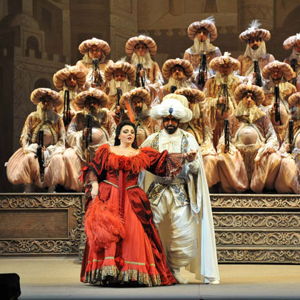
Overview
Synopsis
The jolly Bey of Algiers, Mustafa, has grown bored of his harem and his lovely wife, Elvira. Fortunately, he has recently acquired a new slave who is from Italy. This Italian man has charmed his way into the Bey’s heart with his personality and his talk of Italian women. The Bey has decided that he himself must take an Italian woman as a new wife as this will surely raise his spirits. The Italian, a young man named Lindoro, is terribly sad to be away from his love, Isabella, and bemoans his loss of her constantly. Unbeknownst to him, Isabella, has journeyed the world searching for him and she has shipwrecked in Algiers. When Mustafa meets her and learns she is Italian, he is very intrigued by her and knows she is his new conquest. Isabella is everything he hasn’t had; she is confident and strong-willed, and does not easily fall for men. The Bey immediately knows that he must marry her, but Isabella has a trick or two up her sleeves to make sure that she can marry, and rescue her love, Lindoro.
1813 proved to be a very important year for Rossini. A gifted and promising young composer, Rossini had only completed minor works and some one-act theatrical works until this point. But in 1813, at the age of 21, he completed two full-length operatic works, Tancredi and L’Italiana in Algeri. Both operas were huge successes and established Rossini as one of the most successful contemporary composers. Rossini’s fusion of melody, comedy, and vocal fireworks make L’Italiana in Algeri one of opera’s best loved comedies, and have established its permanent place in the operatic canon.
Show Information
- Music
- Gioachino Rossini
- Lyrics
- Angelo Anelli
- Category
- Opera
- Age Guidance
- Youth (Y)/General Audiences (G)
- Number of Acts
- 2
- First Produced
- 1813
- Genres
- Comedy
- Settings
- Multiple Settings
- Time & Place
- the palace of the mustafa in algiers, 19th century
- Cast Size
- medium
- Orchestra Size
- Medium
- Dancing
- None
- Ideal For
- Professional Opera, Mostly Male Cast, Includes Mature Adult, Young Adult, Adult Characters, Medium Cast
Context
Plot
Characters
| Name | Part Size | Gender | Vocal Part |
|---|---|---|---|
|
Lead |
Male |
Bass |
|
|
Lead |
Male |
Tenor |
|
|
Lead |
Male |
Bass |
|
|
Lead |
Female |
Mezzo-Soprano |
|
|
Supporting |
Female |
Soprano |
|
|
Featured |
Female |
Mezzo-Soprano |
|
|
Featured |
Male |
Bass |
|
|
Ensemble |
Either Gender |
Soprano, Mezzo-Soprano, Tenor, Baritone, Bass |
Songs
Act One
- Overture
- Introduzione - Serenate il mesto ciglio (Elvira, Zulma, Haly, Mustafa, Chorus)
- Cavatina - (Lindoro)
- Duet - Se inclinassia prender moglie (Lindoro, Mustafa)
- Chorus - Quanta robba (Chorus)
- Cavatina - (Isabella, Haly, Chorus)
- Duet - Ai capricci della sorte (Isabella, Taddeo)
- Aria - (Mustafa)
- Finale - Viva il flagel delle donne (Elvira, Zulma, Haly, Taddeo, Isabella, Lindoro, Mustafa, Chorus)
Act Two
- Trio and Chorus - Uno stupido uno solito (Elvira, Zulma, Haly, Chorus)
- Cavatina - Oh come il cor di giubilo (Lindoro)
- Chorus - Viva il grande Kaimakan (Taddeo, Mustafa, Chorus)
- Aria and Chorus - (Taddeo)
- Cavatina - Per lui che adoro (Isabella, Lindoro, Taddeo, Mustafa)
- Quintet - Ti presento di mio man (Elvira, Isabella, Lindoro, Taddeo, Mustafa)
- Aria - Le femmine d’Italia (Haly)
- Trio - Pappataci, che mai sento (Lindoro, Taddeo, Mustafa)
- Chorus - Pronti abbiamo e ferri e mani (Chorus)
- Rondo and Chorus - Amici in ogni e vento (Isabella, Chorus)
- Finale - Dei Pappataci s’avanza il coro (Elvira, Zulma, Haly, Isabella, Lindoro, Taddeo, Mustafa, Chorus)
A song with an asterisk (*) before the title indicates a dance number; a character listed in a song with an asterisk (*) by the character's name indicates that the character exclusively serves as a dancer in this song, which is sung by other characters.
Monologues
Scenes
Key Terms
Sorry! We do not currently have terms for this guide.
Videos
Quizzes
Themes, Symbols & Motifs
Sorry! We do not currently have learning modules for this guide.
Quote Analysis
Sorry! We do not currently have learning modules for this guide.
